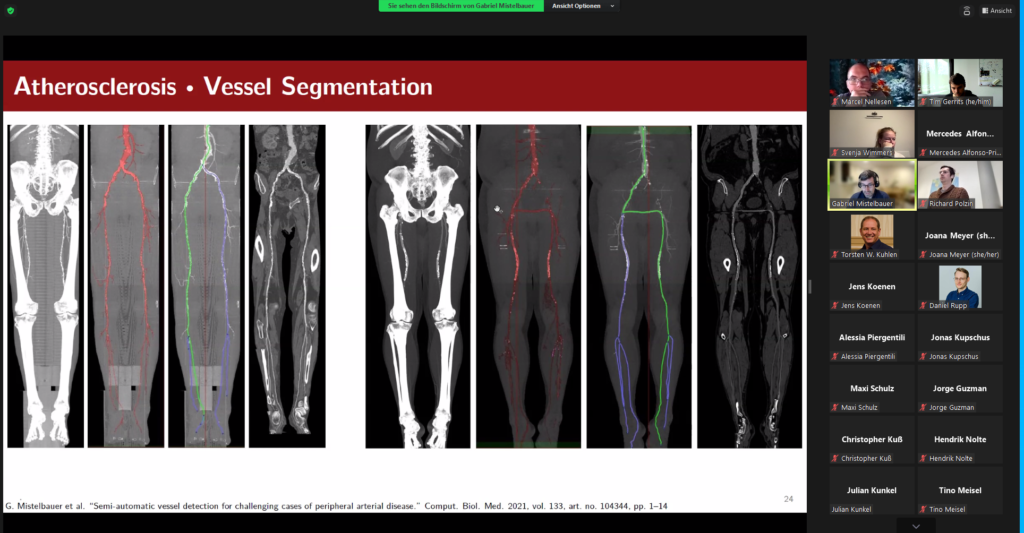Data-Driven Healthcare: Leveraging Visualization and Data Management for Digital Patient Studies
A major strength enabled through NHR4CES lies in the collaborations and exchange between various different fields of research that are part of our team. This was one driving factor behind our second community workshop in 2023. As the medical domain especially benefits from interdisciplinary work, our SDL Digital Patient teamed up with our CSG Visualization and the CSG Data Management to organize a workshop on Data-Driven Healthcare which took place on 21 and 22 November 2023.
Based on our own experience as well as the feedback from the participants, the workshop was a great success, thanks to a combination of excellent invited speakers, active panel discussions and hands-on sessions of useful tools. Several renowned experts from the different domains, including partners within the NHR network as well as external international research institutes and universities, shared their views and experiences in the two-day workshop and helped to develop new ideas on how to improve current best practices with about 50 online attendants.
You can find the presentations below.

Copyright: NHR4CES
On the first day, Prof. Dr. Matthias Müller from the Management Board of NHR4CES welcomed everyone to the workshop and gave an overview on the goals and vision of NHR. The workshop was moderated by Dr. Tim Gerrits from CSG Visualization.
Our first speaker, Dr. Mercedes Alfonso-Pietro from the Forschungszentrum Jülich, provided insights on AI in molecular medicine in the talk “From bedside to `computational` bench and back: Insights from molecular medicine”.
Afterwards, Paul Kießling from the Kuppelab of the University clinic Aachen (UKA) gave an introduction in his work in Mapping Disease with Spatial Transcriptomics. He presented his current research and highlighted the challenges of large medical data.
To provide insights into how visual tools can aid practitioners in the medical domain, Dr. Gabriel Mistelbauer from the Stanford University School of Medicine presented his contributions in the field of “Visual Analysis of Human Anatomy”.
The first day of the workshop concluded with a panel discussion with the invited speakers, Dr. Mercedes Alfonso Pietro, Dr. Gabriel Mistelbauer and Prof. Volkmar Schulz, which brought up several interesting challenges and chances that the community currently faces.
The second day started with equally fascinating insights: Prof. Anja Hennemuth from the Charité Berlin / Fraunhofer MEVIS provided her insights and work on “Visualization and Interaction with AI in Cardiovascular Medicine”, which covered numerous contributions for medical personnel in various stages of patient treatment.
This was followed by a talk on “Deep Learning 4 Pathology” by Prof. Peter Boor from the University Clinic Aachen (UKA), in which he detailed how deep learning was reshaping the field of pathology..Highlighting both, potential improvements, and dangers in sustainability and explainability in the integration of end to end machine learning approaches.
To emphasize on the contribution that can be achieved by harnessing networks and collaboration, we presented tools and platforms that support researchers developed within NHR4CES in a hands-on / practical section. The first talk was given by Marcel Nellesen on the research data management platform Coscine. In a short live demonstration he showed features of the platform and explained how researchers can integrate it in their daily workflow.
This was followed by a presentation by Richard Polzin from the University Clinic Aachen (UKA) on the “Diagnostic Expert Advisor”, a platform for the development of machine learning models on medical time series data. In his demonstration he outlined the core concepts behind the tool and provided examples on how to use the platform.
After the practical section, Prof. Dr. Julian Kunkel, from the GWDG, gave a computer Science Perspective on Data-Driven Healthcare, highlighting security requirements for HPC systems and challenges in data management.
The workshop was concluded by an open discussion that allowed the exchange of ideas and the identification of future task areas in the intersection between the topic of digital patients, visualization and data management.
We would like to thank all speakers and guests for an interesting workshop and look forward to future corporations.
Below you find all available presentations from the NHR4CES Community Workshop:
– Dr. Mercedes Alfonso-Pietro, Forschungszentrum Jülich, “From bedside to `computational` bench and back: Insights from molecular medicine”
– Paul Kießling, University Clinic Aachen (UKA), “Mapping Disease with Spatial Transcriptomics”
– Dr. Gabriel Mistelbauer, Stanford University School of Medicine, “Visual Analysis of Human Anatomy”
– Prof. Anja Hennemuth, Charité Berlin / Fraunhofer MEVIS, “Visualization and Interaction with AI in Cardiovascular Medicine”
– Prof. Peter Boor, University Clinic Aachen (UKA), “Deep Learning 4 Pathology”
– Marcel Nellesen, RWTH Aachen University, “Coscine – Makes research data FAIR!”
– Richard Polzin, University Clinic Aachen (UKA), “Workshop on Diagnostic Expert Advisor”
– Prof. Dr. Julian Kunkel, GWDG “A Computer Science Perspective on Data-Driven Healthcare”